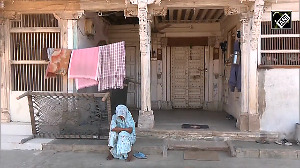'We will resist it.'
'Farmers will not let that happen.'

As the protesting farmers threaten to stage a tractor rally on Republic Day, the government hopes that the long farmers' protest will end before January 26.
"The government is pretending through these laws that a certain Mr Ambani and a farmer have the same strength and same bargaining capacity," Avik Saha, national convenor, Jai Kisan Andolan, tells Rediff.com's Syed Firdaus Ashraf.
- Part 1 of the interview: 'Insertion of MSP in three farm laws is no solution'
Agriculture economist Ashok Gulati (a member of the Supreme Court-appointed committee), says that milk and poultry business are the two places where the government does not intervene and does not give any MSP.
They are flourishing in India and growing with the help of market forces.
These three farm bills will help agriculture too to grow the same way.
In the milk sector, the government has the largest intervention because the National Development Dairy Board encouraged, fed and helped create very large cooperative milk producers all over the country.
The famous being Amul Cooperative.
Aavin is the cooperative of milk producers of Tamil Nadu where they produce, they decide a price and the government help create a network.
You had Aavin stalls and shops all over Tamil Nadu.
Then private dairy sectors came in Tamil Nadu who offered better prices.
The farmers were then weaned away by these private dairy sectors.
It was a farmers' cooperative, but they started supplying milk to the private dairy sector for better prices.
In 10 years, private companies took over.
Now, they are deciding the price, quality and terms of supply.
The death of the cooperative milk sector in Tamil Nadu is the brightest living example of what is wrong with these three farm Acts.
What privatisation can do to millions of farmers.
No cooperative in this country can function without the active support of the State including Amul.
People forget who seeded fund for Amul?
It was the NDDB and not Nestle.
Public money went into seeding cooperatives.
Cooperatives may look private from outside which they arem but the government pumps in huge effort and resources to prop up the cooperatives so that people become self-reliant.
If people have livelihoods in cooperatives, then they do not stand in lines asking for jobs.
Support to cooperatives is an employment generation scheme of the government.
If you hand this to corporates, then they may or may not employ people.
They will employ if the profit is good and sack you if the profit is not good.
Profit for self and profit for all. That is the difference between corporate and cooperatives.
What about poultry?
Are they not growing without government support or minimum support price?
Indian poultry is a completely cartelised industry where all the risk is taken by small operators having 1,000 or 2,000 birds.
Every risk is taken by them and every gain is cornered by three or four companies.
From hatchling to feed, everything I buy from these companies.
They have a buy back arrangement.
This is exactly what contract farming is.
Is this business not growing big enough and helping farmers as Mr Gulati argued?
He is not co-relating the data of conversion from vegetarianism to non-vegetarianism and the growth of population.
If Mumbai city's population is growing by 1 per cent every year, then shall we say Mumbai's economy is doing well?
It is growing because people have lesser options in the hinterland and they are converging in Mumbai.
The poultry sector is growing for two reasons.
First is the great advertisement for instant profit.
This I know very well as I have several friends in the poultry sector.
It has two tiers.
One tier makes profit and the other tier buys lottery tickets.
Sometimes you gain and sometimes you lose.
When the bird flu hit, who do you think bore the loss?
Not the egg maker or the hatcheries, but every small farmer.
Most poultry people take this as a subsidiary business.
I am a farmer, I grow wheat and I can set up a small portion of my land to set up poultry.
Agents of these companies are hanging around everywhere and pursuing farmers by telling them that how profitable and secure this business is.
They will tell farmers this is an end-to-end business.
They say we will give you eggs for free and buy your chicken too.
Has any constructive results been achieved in the talks with the government?
Farmers are more interested than the government for the talks.
It is they who are sitting in 3 degrees centigrade on the roads.
The government wants talks, but the government does not want to set an agenda for the talks.
No negotiation in the world can take place without the parties knowing what their negotiation rights are.
Can the government put down five lines saying that the talks will be on these lines?
The government repeatedly says it is open to some amendments. The farmers are repeatedly saying they are open to discussions where they say you keep the Act saside and talk about our actual needs which is stabilisation of our income.
The government is not willing to set that agenda.
So, these talks are more for public relations and communication than having any meaningful impact on the actual problem facing the farmers.
Why has Prime Minister Modi lost the trust of farmers who voted for him in May 2019?
PM Modi decided to use that mandate to reform the agri sector so that large corporate benefit from that.
80 per cent of farmers are very small.
They are not ready to die at the altar of these reforms.
Everyone wants to be in the food business because it is a perpetual business and profitable business.
It will never go out of style.
Like telecommunications and the petrochemical business.
We (farmers) understand for whom Mr Modi is batting for and we will resist it.
Farmers will not let that happen.
The economy of this country survived in the lockdown because agriculture is in multiple hands.
At the first sign of crisis (COVID-19) we saw 10 crore (100 million) people from the industrial sector -- be it MSME or large companies -- walk home.
Handing over the agriculture sector to large companies is not going to give security to the people of this country.
Industry has not (given security).
We have liberalised industries for the last 30 years.
Even today that liberalisation is not enough.
Any protection that workers have the government wants to roll up and wrap up.
They want zero protection for workers. this will not work in democracy.
Democracy is for the majority and the majority of this country is working class and poor people.
For them the laws of the government must stand for them, to secure them.
No rosy pictures should be given that you will have a great future if Ambani buys your cropS.
Ambani will buy crops for profit and for his shareholders.
He is not accountable to the people of India.
Feature Presentation: Ashish Narsale/ Rediff.com












 © 2025
© 2025